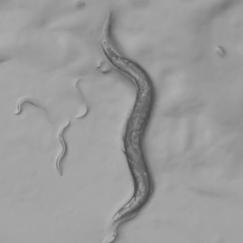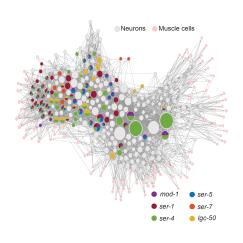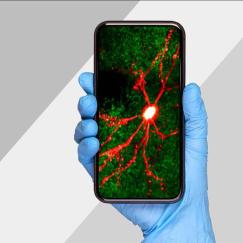“This work will help uncover fundamental signaling mechanisms that might allow the gut microbiome to impact human health and behavior,” said Flavell, Lister Brothers Career Development Professor in MIT’s Department of Brain and Cognitive Sciences. “This is a research area of great interest right now, but also an area where there is still a need for new mechanistic insights.”
Working in the simple but instructive model of the C. elegans nematode worm, Flavell’s lab recently discovered how an “enteric” neuron called NSM employs specific genes that are also present in humans to deploy bacterial sensors in the worm’s alimentary canal. The worms eat bacteria, so NSM’s sensors allow the worm to know when it is feeding and adjust its locomotion behavior accordingly (e.g. by slowing down to enjoy the meal).
With the award, Flavell plans to follow up on those findings in three ways. In one set of experiments the lab will seek to identify how the bacteria activate NSM’s sensing mechanisms. In another, the scientists will investigate other enteric neurons whose functions aren’t known, but whose anatomy suggests may be similarly tapped into the alimentary canal. Finally, the team will examine how the rest of the nervous system feeds back to these enteric sensory neurons. For example, when the worms are sated, the sensory neurons have diminished food responses compared to when they are hungry.
Flavell said the support of the award, $75,000 a year for three years, will be invaluable for pursuing these studies.
“I'm extremely grateful to the McKnight Foundation for supporting our research, and for supporting me as an early-career investigator,” he said.





